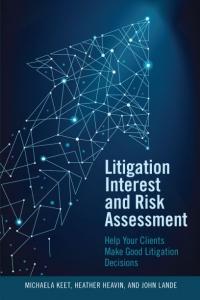By Michaela Keet, Heather Heavin, and John Lande

This book is written to help everyone involved in litigation to make better decisions. Even the most experienced litigators will gain valuable guidance from this book with its many practical illustrations and checklists for effective and ethical practice. This book also is very relevant for corporate and government counsel and executives, settlement conference judges, and law school faculty and students.
Although parties may receive significant benefits from litigation, they generally also incur substantial risks and costs in the process. Parties settle most cases to avoid or minimize these risks and costs. To develop a negotiation strategy, they and their lawyers try to anticipate the likely court result and costs if they don’t settle. Predicting risks and costs is very difficult, and empirical research shows that in most cases going to trial, one side rejects an offer that is more favorable than its trial result.
Litigation imposes many intangible costs such as litigation stress, damage to relationships and reputation, dysfunction in organizational parties, and loss of opportunities – in addition to tangible costs of legal fees and expenses. When developing negotiation strategies, lawyers and litigants often ignore or undervalue their intangible costs.
Based on empirical research, this book provides thorough advice about lawyers and mediators can work with their clients to develop realistic “litigation interest and risk assessments” (LIRA) and help them use these assessments to make better decisions about litigation, negotiation, and mediation. It sets out the ethical rules requiring lawyers to help clients make informed decisions and requiring mediators to refrain from coercive techniques, and explains why lawyers often do a poor job of informing clients about the likely outcomes of litigation. It provides detailed descriptions of intangible costs that individual and organizational parties often incur in litigation. Then it presents a simple framework for conducting a LIRA process as well as more sophisticated tools for estimating court outcomes. It describes how lawyers, mediators, and settlement conference judges can help parties use LIRAs to make good decisions in litigation. It offers advice and practical checklists that readers of all philosophies of lawyering, negotiation, and mediation can use and adapt in working with clients.
Litigation Interest and Risk Assessment fills a gap in the library of practice guides about assessment of parties’ interests and risks in litigation. It is a must-read for litigators and mediators who care deeply about their clients and want to help them as they struggle to deal with their problems through the legal system. This guide will help readers to:
- Recognize and avoid common decision-making errors in litigation
- Anticipate likely court outcomes more accurately
- Communicate with clients about what’s most important to them in their case
- Help clients make better decisions
- Negotiate and mediate more effectively
- Learn about technological tools to help make decisions in litigation
This short video provides more information about the book.
“This important book pulls together interdisciplinary and practical research for helpful and realistic pointers. These are real things that real lawyers who work with real clients can do tomorrow.”
Andrea Kupfer Schneider, Professor of Law and Director, Dispute Resolution Program, Marquette University Law School
“Litigation Interest and Risk Assessment fills a void in legal education with practical knowledge about risk analysis in dispute resolution. Everyone involved in the settlement of lawsuits should make use of this valuable resource. Clients will be grateful.”
Michael Palmer, Legal Risk Management
“A splendid guide for lawyers, judges, and mediators—clear, thoughtful, thorough, and grounded on extensive research, experience, and insight. I wish this had been available a long time ago.”
Leonard L. Riskin, Harris H. Agnew Visiting Professor of Dispute Resolution, Northwestern University Pritzker School of Law, Chesterfield Smith Professor Emeritus, University of Florida Levin College of Law
Click here for more praise of the book.
Click here to read the table of contents and introduction.
Click here to get a copy of the book.
Faculty considering using this book as a required or recommended text for a course can get an examination copy by emailing John Lande.